
Who Wants to Be a Mathematician--Where Are They Now?
"It was certainly one of the highlights of my time in high school, the competition as well as the great support I got from my classmates for it." Dragos Ilas, 2004 and 2005 contestant
Here's a chance to catch up with some former Who Wants to Be a Mathematician contestants, from Alden Adolph to Ben Zauzmer. They're a very successful group and it's a pleasure to know them. They wrote to us in the summer of 2012 about what they're doing now.
Alden Adolph • Cory Colbert • Andrew Ding • Rebecca Easterwood • Abraham Engle • Anthony Grebe • Dragos Ilas • James Kingsley • Holden Lee • Kathy Lin • Ofir Nachum • Richard Spence • Daniel Sun • Noah Taylor • David Wise • Xiaotian Wu • Andrew Xu • Charles Xu • Kevin Yin • Ben Zauzmer
Alden Adolph winner of $2000 and a TI-Nspire at the game at the 2007 Joint Mathematics Meetings in New Orleans
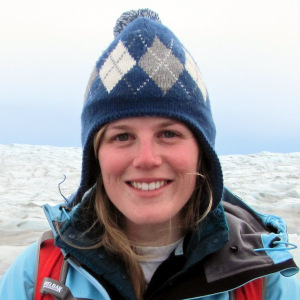
I'm currently a first-year PhD student at the Thayer School of Engineering at Dartmouth College. My research involves materials science, specifically the physical properties of snow and firn. I am also part of an IGERT fellowship program which focuses on Polar Environmental Change. All of the mathematics fundamentals that I learned continue to be a huge part of my work, and more applied math courses are in my future! I remember being quite nervous before competing. My calculus class, my math teacher Mrs. Sarrat, my mom and a number of my friends from school came out to support me, which made it lots of fun. I don't remember any of the questions, but do remember using trigonometry. I still regularly use the graphing calculator that I won that day! It was a great experience and I remember it quite fondly.
Cory Colbert winner of $2000 and a TI-Nspire at the at the 2009 SACNAS National Conference in Dallas
The two most memorable moments about the competition were the very beginning and the very end. I recall reading the schedule of events the day before [the game], and seeing Who Wants to Be a Mathematician listed as the breakfast plenary. I assumed it was some talk about being a mathematician and how fun that is--I had no idea it was a competition. A very good friend, and eventual fellow participant, asked if I was going to try out for "the competition." After some reluctance I decided to take the qualifying exam during the "Conversations with Scientists" activity. Much to my surprise, I was among six who were selected to participate in the contest on the following day. Seeing as though only hours beforehand I didn't even know what [the game] was, I knew that there was no way I would win! Any one of my other five peers were at least as qualified as I.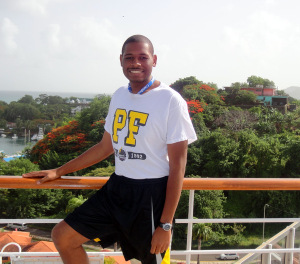
The very end was the most interesting, though. I shocked myself by making it to the Bonus Round and was certain that I could not answer whatever question remained. I remember it vividly: What is 299 mod 101? I had NO IDEA how to proceed, and the clock was ticking. I did some calculations that ruled out a few choices I think, but it wasn't enough to be absolutely certain of anything. Then, the strangest thing happened: I wrote the number "51" on my paper and circled it then put a "?" by it. Out of the choices presented, the number 51"'felt" like the right one. Amazingly, it was right.
I am now a second-year graduate student at the University of Texas at Austin. My current interests include Diophantine equations and arithmetic geometry.
Pictured: Cory aboard the Carnival ship Victory on his birthday this summer. Behind him is St. Lucia.Andrew Ding winner of $3000 and a TI-Nspire at the 2009 Arnold Ross Lecture in Augusta, GA
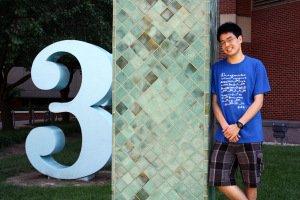
I remember the day pretty well, although I don't remember too many details. I liked the lecture we had that day, in particular, I remember a domino-tiling chessboard problem (if you remove two opposite corners of a 8x8 chessboard, can you still "tile" the altered chessboard with 2x1 dominoes?). Actually, that problem came up in a lecture recently, and somehow, I still remembered not only the answer, but also the solution, so that was pretty neat.
On the actual competition, I remember feeling a mix of anxiety and relaxation. I was relaxed since the problems were not as horribly difficult as I feared, but I was anxious because, as I was watching the first half, my competitors were going to be tough. When I got on the stage, I felt really nervous because I had fallen behind in the beginning, but fortunately, I was able to solve some of the later problems. The most difficult question was definitely the square-off. I remember that it had to do with a clock and the angle between the hour and minute hands. I got scared when I realized I must have done something wrong because the answer I got was not listed as one of the choices. I think I had to spend a whole minute or two trying to get the right answer. Luckily for me, it didn't seem my opponent had the right answer before I did. I didn't think the last question was as hard as the square-off, although there was more time pressure.
I spent the money on a trip to Spain that was sponsored by my school. It was pretty fun despite the rain. Spain was a really nice place for a vacation.
Right now, I just finished my second year as an undergraduate at the University of Chicago. I am definitely still involved in mathematics, in fact, I plan on majoring in it. However, I have not written any papers or have a website or anything, although I am doing a little bit of research on algebraic geometry this summer. I have met some really intelligent post-docs and professors here at UChicago, and perhaps in a few years, I'll have some papers and my own website as a graduate student.
Rebecca Easterwood contestant at the first national contest at the 2010 Joint Mathematics Meetings in San Francisco, winner of Five-Minute Mathematics and $500
I am currently a junior with a 4.0 GPA at Jacksonville State University. I am studying for a degree in Dietetics. During the school year I work as a tutor for the Academic Center for Excellence where I tutor biology, algebra, statistics, English, and nutrition courses. I really enjoyed my experiences with the Who Wants To Be a Mathematician competition in San Francisco. I remember being nervous before the competition and feeling like I didn't quite fit in with the group involved. However, it was a very good growing experience.
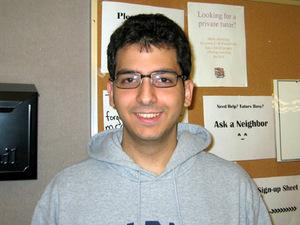
Abraham Engle who won $2000 and a TI-Nspire at the 2010 SACNAS National Conference in Anaheim, CA
I am now attending the University of Washington in the PhD program in mathematics. I really enjoyed the competition and the SACNAS conference. It was a very memorable experience, and I cannot thank the AMS enough for the generous award. [Abraham's web page.]
Anthony Grebe runner-up at the 2011 national game in New Orleans, winner of $3000 and a TI-Nspire
My dominant memory from the competition was the extent to which the students at my school supported me in the competition. I also remember coming from behind during the semifinals round (I think that I was in last place near the beginning of the round) and that I briefly pulled ahead in the finals round after the first question. If I remember correctly, I was nervous during the first round (especially after I missed a few questions near the beginning), but I was significantly calmer in the finals round as I had not expected to go this far.
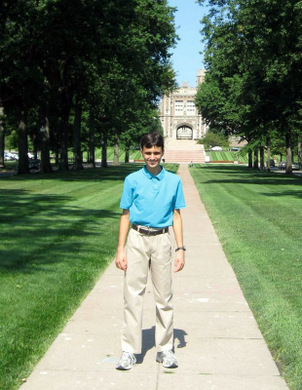
I was part of a school team that won Moody's Mega Math Challenge (2011), a fourteen-hour contest in applied mathematics (which was very different from this fast-paced competition), and our team's paper was published online in the Society for Industrial and Applied Mathematics' online undergraduate journal.
I am definitely still interested in mathematics, and I am planning to major in math at Washington University in St. Louis, where I will be attending this fall.
Dragos Ilas winner of $500 at the 2005 Joint Mathematics Meetings in Atlanta and of $2000 and Maple 9.5 at Southern Polytechnic State University in Marietta, GA in 2004
I'm glad to see that the Who Wants to be a Mathematician contest is still going strong. It was certainly one of the highlights of my time in high school, the competition as well as the great support I got from my classmates for it. I am now a graduate student at the University of Tennessee-Knoxville studying the math of crystal structures.
James Kingsley winner of a TI-Nspire graphing calculator at the 2007 Arnold Ross Lecture at the Museuem of Science in Boston
I'm now a PhD student in physics at Worcester Polytechnic Institute. I'm working on computational fluid dynamics, specifically stochastic rotation dynamics. I spent the last two years putting together my software, and am now starting to use it for real-world problems, such as infertility and HIV, in conjunction with Harvard Med.
Holden Lee winner of $2000 and a TI-89 graphing calculator at George Washington University in 2007
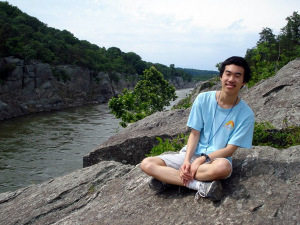
Right now I'm a rising senior at MIT, studying math. I plan to be a math professor, most likely specializing in number theory (so yes, I do still want to be a mathematician). This summer, I'm working at Gliya, an educational startup devoted to making a free online math curriculum. I have fond memories of the [Who Wants to Be a Mathematician] competition (maybe it has something to do with the $2000?). It was pretty exciting. I also remember having long messy hair at that time. I still have the T-shirt, cap, bag, and graphing calculator, although I lost my water bottle (fittingly, at AwesomeMath Summer Program).
Kathy Lin, contestant at the first national contest at the 2010 Joint Mathematics Meetings in San Francisco, winner of $667 and What's Happening in the Mathematical Sciences, and winner of a TI-Nspire at the University of New Mexico in 2007
I'm doing well these days, and I'm glad to hear the games are still going strong. I attend Harvard University and will be a junior next year. I am studying chemical and physical biology with a minor in computer science, so the math knowledge I accumulated in high school is definitely paying off. From the competition, I vividly remember when I answered a question correctly about the Poincaré conjecture and you asked me how I knew the answer. For some reason, that caught me so off guard that I said something completely incoherent. Afterwards, the winnings went mostly to help pay for college.
Ofir Nachum, contestant at the first national contest at the 2010 Joint Mathematics Meetings in San Francisco, winner of $1000 and Calculus by Anton, Bivens and Davis

"...my school decided to spend the award money on a trophy case for the various achievements of the math team over the years. It is now built and houses trophies from recent and distant years. It is always a pleasure for me to see it every time I go to visit."
It's great to hear from you and that the national competition is still going well. I was a senior in high school during the competition so since then I graduated high school and am now a rising junior at MIT studying computer science and mathematics. I actually run into Charles (Xu) quite often, as he is also now at MIT. Right now I am in Berlin for the summer doing an internship with Siemens.
As for the competition, I do remember it was a lot of fun meeting the other contestants. The contest itself was very fast paced and it was definitely a challenge keeping up with the others. I also remember that San Francisco was a great city to have the competition in. I was with my mom for the weekend and we had a great time exploring the city.
I think I mentioned this in a previous email, but if not, my school decided to spend the award money on a trophy case for the various achievements of the math team over the years. It is now built and houses trophies from recent and distant years. It is always a pleasure for me to see it every time I go to visit.
Richard Spence, a three-time contestant: at the 2012 national competition at the Joint Mathematics Meetings in Boston, and at the 2011 national competition at the Joint Mathematics Meetings in New Orleans, at which his combined winnings were $1000 and two copies of Five-Minute Mathematics, and at the University of Arizona in 2008, when he won $3000 and a TI-Nspire
Yes, I do remember the competitions vividly--for some reason I was too nervous and made silly mistakes (even though I solved all the problems correctly afterwards, except for the Sudoku one).
Right now, I'm in Los Angeles at Accord Institute's A* Summer Math Camp, held at CSU-Northridge. Last week I taught AMC10-12 number theory classes, and next week I'll be teaching MATHCOUNTS geometry. Additionally, a few other students and I are writing MATHCOUNTS, AMC, and AIME problems for future mock exams. In August, I'll be going to MIT for my undergraduate studies.
In terms of Scrabble, I've only played in a couple local tournaments since last January, and it'll probably be a few years before I'll be able to play in Div. 1 at Nationals. I'll try to hook up with the Boston or Cambridge Scrabble clubs. [Richard finished fourth and second in the 2010 and 2011 National Scrabble tournaments.]
Daniel Sun winner of $2500 and a TI-Nspire at the 2011 Annual Meeting of the American Association for the Advancement of Science
It certainly was a great pleasure participating in Who Wants to be a Mathematician. I would have loved to attend this year's competition in DC as well as the Rubik's Cube competition (I qualified for our school team this year), but unfortunately, FIRST (For Inspiration and Recognition of Science and Technology) FRC (FIRST Robotics Competition) World Championships was at the same time. But I heard my good friends Victor Ying and Jake Koenig did very well. Last summer, I interned at the National Institute of Standards and Technology, more specifically the nuclear reactor in the NIST Center for Neutron Research. Right now, I am working for a startup company doing programming.
I remember the competition very well. My family as well as my teacher, Ms. Loomis, were both in the audience to cheer me on. I remember three questions the best, the one I got wrong, the tiebreak, and the 2k question. The question I got wrong I remember spending a couple of tries on afterwards involved the radius of an inscribed circle given the x and y intercepts. The tiebreak question involved writing squares as the sum of squares? I remember the answer being it was impossible and the excitement that followed.
I was much more relaxed than probably the others since I really enjoy high-pressure situations and competitions. The George Washington University Colonial Bowl, a 4-person team buzzer competition, really gave me good practice for high-speed thinking.
I will be pursuing a major in computer engineering at the University of Maryland, but I am also trying to get as many math and physics courses in as well. I believe I can handle a math minor if not another major.
I'm very thankful you gave me the chance to participate in such a great competition, it is a shame I could only go once. I think it is great that you are still keeping in touch with former participants.
Noah Taylor, contestant at the national competition at the 2011 Joint Mathematics Meetings in New Orleans, winner of $1000 and Calculus by Anton, Bivens and Davis

I attend The Ohio State University, majoring in math (of course). I'm in a research program set up by Sergei Chmutov, trying to study knots, but what we're studying appears to be unfixable so there's no real focus right now. The day of the competition, I remember my dad and I went to a Wendy's restaurant but I was so nervous about the competition I could barely eat anything. I always thought that was just a figure of speech, but it actually happened. There are two main questions that I remember. The first question I remember is the one about "If I flip a coin until I get 2 heads in a row, what is the probability I stop after 7 flips?" because it's a recursion problem that I solved easily (Fibonacci numbers) while lots of other people didn't get it. The other one was the last one, "What is the ratio of blue space to yellow space in this picture?" because I was in the lead until that point, and then Anthony guessed ... and Bryce, I assume, solved it legitimately. As I was sitting down, I drew two extra lines in the diagram in my head and instantly solved it, which made me mad because all I wanted to do was win the TI N-Spire. But then Evan and Anthony dueled it out and it was cool to see Evan in action because I'd read about his IMO achievements. So then we finished and that's all I'm going to tell you. It was a great experience and I'd love to do it again, but of course I can't.
David Wise, contestant at the national competition at the 2011 Joint Mathematics Meetings in New Orleans, winner of $750 and What's Happening in the Mathematical Sciences
"Being part of [Who Wants to Be a Mathematician] was a great memory for me. I remember looking at the web page the summer before and thinking how much fun it would be to qualify. My family and I really enjoyed the trip to New Orleans, and it was enjoyable to get to participate in such a unique math contest."
I think I was fairly relaxed during the game, but I was concentrating pretty hard. I remember trying to solve the questions during the first round before I was up. I remember one question involved having to determine whether pi squared or 10 was bigger quickly, that there was a question about counting the number of paths in some pattern that passed through a red dot, and I think the last one was about digits of numbers, and I forgot that divisors of 9 (bigger than 1) worked so I thought 9 was the only answer, but 3 also worked.
Right now I double-majoring in math and computer science at Carnegie Mellon University. I received a full-tuition math scholarship there. Four other freshmen and I there were placed into the sophomore Honors math courses, which were an abstract algebra class and a real analysis class, so my math classes were challenging for me but I learned a lot from it. I tied for 19th place in the Virginia Tech Regional Math Contest for college students . This summer I'm doing computer science research with a professor in the area of keystroke dynamics: trying to identify users and learn things about them based on their typing rhythms. A bunch of math is involved in the statistical analysis and machine-learning aspects of it.
Being part of [Who Wants to Be a Mathematician] was a great memory for me. I remember looking at the web page the summer before and thinking how much fun it would be to qualify. My family and I really enjoyed the trip to New Orleans, and it was enjoyable to get to participate in such a unique math contest. It was also really great to be able to attend the Joint Mathematics Meetings--I heard several talks and was able to see some interesting books and displays.
Xiaotian Wu, winner of $1000 and a TI-Nspire in April 2009 and winner of Calculus by Anton, Bivens and Davis in April 2008, both at Providence College
I am now a sophomore at Dartmouth College studying biomedical engineering. I remember the competition day very vividly [2009], especially the final bonus trig question since I did not answer it correctly and missed the $2000 prize. However, the $1000 that I won went to my mother, as I promised! And I am actively using the TI-Nspire calculator that I won as well! The competition was a wonderful experience for me and I hope it brings enjoyment, confidence, and challenge to high school students for many years to come.
Andrew Xu, winner of $3000 and a TI-Nspire at the University of British Columbia in October 2010
I am studying engineering science at University of Toronto (first year). The preferred option is biomedical engineering and financial engineering. The money that my helper/partner/whatever Larry Liu and I won, was spent to treat our friends^_^, as Larry said he would spend on donuts and we needed lots of friends to eat up the 3000 USD donuts.
I would like to thank you again for the opportunity.
Charles Xu, contestant at the first national contest at the 2010 Joint Mathematics Meetings in San Francisco, winner of $1000 and Maple 13
I'm at once glad that my wisecracks from two years ago are still remembered in some parts, and disappointed that they haven't since been superseded by even more uproarious onstage antics. I felt at the time that I could loosen up, knowing full well that I was surrounded by people whom I recognized (from MOP) to be much smarter than me, and that I should be content with whatever place I ended up getting.
This attitude also served me in good stead during my freshman year at MIT. I'm currently majoring in physics, though planning on doubling in math as early as possible starting next year. And I approach both with the mindset that people all around me are outclassing me all the time, even in the fields that interest me most, and that my focus should be on doing what I love and enjoying my time there. To that end I joined the Theta Xi fraternity, an experience I've so far found incredibly rewarding and well worth the considerable time I've invested.
This summer I've returned to Boulder, CO on a Summer Undergraduate Research Fellowship with the National Institute of Standards and Technology (NIST), splitting my time between quantum simulation and information processing in a Penning ion trap at NIST and theoretical work on entanglement in open spin systems at CU Boulder.
Kevin Yin, contestant at the first national contest at the 2010 Joint Mathematics Meetings in San Francisco, winner of $667 and Five-Minute Mathematics, and winner of Maple 12 at Cal State Fullerton in 2008
The question I remember most distinctly from [Who Wants to Be a Mathematician in 2010] was the one involving counting ~20 primes, which was not really feasible in the short time limit we were given. All of us guessed a random answer, and I happened to get lucky. I'm currently enrolled as a to-be-sophomore in Caltech as a math major, but I also have interests in other fields such as physics and biology. Over the summer, I'm doing work in biology in Caltech's Elowitz lab.
Ben Zauzmer runner-up at the first national game at the 2010 Joint Mathematics Meetings in San Francisco in winner of $3000 and a TI-Nspire

Ben broadcasting a Harvard basketball game
It feels like much less than two-and-a-half years since I had the thrill of competing in the first national [Who Wants to Be a Mathematician] competition in San Francisco. I was a high school junior at the time, and the trip out west from Philadelphia was the highlight of the year. My mom came with me, and we enjoyed a wonderful weekend of cable cars, clam chowder, and of course, math. Though the central event of the journey was the competition, I wasn't too nervous heading into it, as I expected that all of the other kids would be extremely talented so a good deal of luck was involved. Sure enough, everyone in my semifinal performed very well, but I was the one who received the luck: I was able to take an educated guess on a question involving quadrilateral areas, which turned out to be correct, sending me into the championship. Though I lost to Evan O'Dorney, I was still quite proud and pleased with how the morning went.
Since January 2009, I have finished high school and started college at Harvard (where I reunited with Evan, one of my classmates). In between school years, I have held various jobs including tour guide and programming baseball records for a website.
In June 2012, I served as a proctor at ARML Penn State, affiliated with my alma mater Lehigh Valley Fire, which gave me the chance to see Mike and Bill again! It was great to catch up in person, and to see that [Who Wants to Be a Mathematician] could still draw huge crowds despite a nasty Pennsylvania rainstorm. Best wishes for the continuing success of [the game], hopefully with sunnier days ahead!
The AMS thanks sponsors Texas Instruments, Maplesoft, and John Wiley and Sons for supporting Who Wants to Be a Mathematician.
Photographs and text above courtesy of the former contestants.

